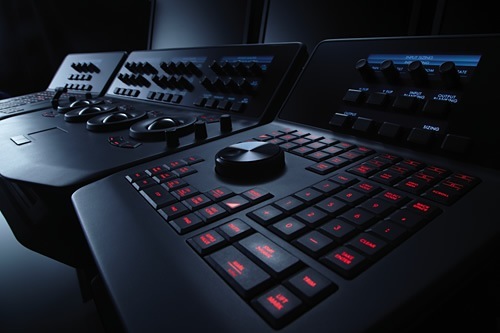Blackmagic Design (http://www.blackmagic-design.com) is shipping DaVinci Resolve 7.0 for Mac OS X with pricing starting from US$995. It’s the latest version of the high end DI grading system with features used by both Hollywood and high end post production.
The new version includes a new user interface developed with colorists and benefits from the decades of DaVinci color grading experience, according to the folks at Blackmagic Design. The new DaVinci Resolve 7.0 for Mac now reads and writes all the common Apple ProRes file formats including 4444, 422, 422(HQ), 422 (Proxy) and 422 (LT) directly on the timeline with no conversion required. Colorists can just select the clips in their media storage and DaVinci Resolve will play and grade them in real time, even if there are mixed resolutions and formats on the timeline.
Both Mac OS X and Linux systems now support read and write of DNxHD files with the optional DaVinci Resolve DNxHD Update. This optional $500 update allows native DNxHD media files to move instantly between Avid and DaVinci Resolve.
For production using the new generation of DSLR cameras such as the Canon 5D, DaVinci Resolve 7.0 now supports read and write of H.264 files on Mac and playback on Linux. Now colorists can grade directly from DSLR media files in real time for professional production from these cameras. Also supported in DaVinci Resolve, is full playback support for native Cineform 2D and 3D and SI-2K files for playback and grading in real time.
DaVinci Resolve now supports RED Rocket cards on both Mac OS X and Linux platforms for native r3d file grading with full resolution decoding and premium debayer, all in real time. Colorists can now extract r3d reel names from either FCP, Adobe or Avid EDLs, grade and render to ProRes or DPX or DNxHD at near real time speeds. On Linux, DaVinci Resolve now supports dual RED Rocket cards in a single computer for stereoscopic 3D real time performance with r3d files at full camera image quality.
DaVinci Resolve 7.0 upgrades the stereoscopic 3D grading features and now includes 3D features on the Mac OS X platform that previously required multiple Linux CPUs. The new version features a new convergence control tool to let colorists separately program pan adjustments to change the point of convergence on 3D projects while still making individual eye pan adjustments.
The new stereoscopic 3D support now lets colorists play back, grade and monitor in 3D using side-by-side and line mesh displays. DaVinci Resolve 7.0 lets colorists apply grades made on one eye, automatically apply to the other eye so colorists can see the result instantly. A new eye matching tool is included so colorists can compare between eyes with a color or B&W difference display, or a new checkerboard view that allows a more accurate comparison in greater detail.
All existing DaVinci customers who have an older model DaVinci Resolve or DaVinci Splice will qualify to get this new version 7.0 software at no charge. In addition, anyone who has an older DaVinci 2K system can use the control surface they have, and upgrade to DaVinci Resolve by paying only for the Linux license.


